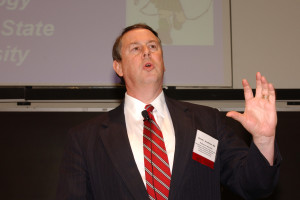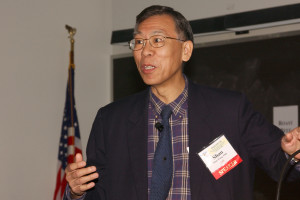2000 – 2005 Research Appreciation Day
2005: “NIH/NCCAM Five-year Strategic Plan and Its Relevance to Osteopathic Medicine”
Shan S. Wong, PhD
Program Officer
National Center for Complementary and Alternative Medicine (NCCAM)
National Institutes of Health (NIH)
Shan Wong, PhD, oversees as research portfolio in cardiovascular, lung, and blood diseases, asthma, allergy, immunology, and small business innovation research (SBIR/STTR) programs. His expertise is in the area of clinical chemistry, biochemistry, and biophysics. Prior to joining NCCAM, he served as a Scientific Review Administrator at the National Institute of Diabetes and Digestive and Kidney Diseases. Before joining NIH, he was Chief of Assay Laboratory at Loma Linda University in California, Director of Clinical Chemistry Laboratory at Herman Hospital in Houston, Texas, Associate Professor of Laboratory Medicine at the University of Texas Health Science Center at Houston, and Professor of Biochemistry at the University of Massachusetts at Lowell.
Dr. Wong received a PhD in Biochemistry from the Ohio State University and completed postdoctoral training at Temple University School of Medicine. He has conducted research in enzymology, protein chemistry, and biophysics and has developed diagnostic tests for cardiovascular, liver, lung, kidney and bone diseases. His interest in complementary and alternative medicine is in the modality of energy healing.
2004: “Clinical Research: A View from the Trenches”

David I. Kaufman, DO
Professor and Chair
Department of Neurology and Ophthalmology
College of Osteopathic Medicine
Michigan State University
David I. Kaufman, DO, is frequently recognized for both teaching and patient care. His students have chosen him numerous times to receive the Distinguished Lecturer Award, the Hooding Award and the Golden Apple Teaching Award. He received the American Academy of Ophthalmology Achievement Award in 2002 and is the Louisa Burns Memorial Lecturer for 2003. Dr. Kaufman is also listed in 2004’s Best Doctors in America, a distinction he’s held since 1996.
He received his medical degree from Philadelphia College of Osteopathic Medicine and earned his bachelor of science degree from the University of Wisconsin, where he also completed a residency in neurology. Dr. Kaufman did a fellowship in neurophysiology at UW, and he was a Harvard Research Fellow in clinical neuro-opthamology at Massachusetts General Hospital in Boston.
2003: “Lessons from the Greatest Public Health Achievements of the 20th Century for the Emerging Problems of the 21st”
Lawrence W. Green, DrPH
Centers for Disease Control and Prevention
Professor Green was Director of the Office of Science and Extramural Research for CDC. He has been on the full-time public health and medical faculties at Berkeley, Johns Hopkins, Harvard, Texas, and the University of British Columbia. He was the first Director of the federal Office of Health Promotion under the Carter Administration, and a Vice President of the Henry J. Kaiser Family Foundation. He has published broadly on program planning, evidence and evaluation issues in health services, public health, and policy. His awards include the highest distinctions of the American Public Health Association, the American Academy of Health Behavior, the Society for Public Health Education, the UC Berkeley College of Public Health Alumnus of the Year, and an Honorary Doctor of Science degree from the University of Waterloo, and election to the Institute of Medicine of the National Academies.
See the list of winners here.
2002: “A Perspective on the Texas Biotechnology Global Industry”
Thomas R. Kowalski
President of Texas Healthcare and Bioscience Institute
Thomas R. Kowalski is President and CEO of the Texas Healthcare and Bioscience Institute (THBI) in Austin, Texas. THBI, founded in 1996, is a statewide, public policy research and education organization whose purpose is to promote medical research, development, and manufacturing in Texas. THBI consists of leading biotechnology, medical device, and pharmaceutical companies, universities and private research institutions.
2001: “Evidence-Based Medicine”
Murray Goldstein, DO, MPH
Medical Director and Chief Operating Officer
United Cerebral Palsy Research and Educational Foundation
Dr. Goldstein is a graduate of the Des Moines University College of Osteopathic Medicine, having received the Doctor of Osteopathic medicine degree. He completed a rotating internship and then a residency in internal medicine at the University Hospital, post doctoral training in neurology at the Mayo Clinical, and received a Master of Public Health degree (Epidemiology) from the University of California. He has been active in the World Health Organizations’s activities in neurological disease, particularly in the area of cerebrovascular diseases.
2000: “The Benefits and Difficulties of Academia Industry Collaboration – The Industry Point of View”
Gerald Cagle, PhD
Senior Vice President for Research and Development
Alcon Laboratories, Inc.
Dr. Gerald Cagle’s background and training is in microbiology with a career in development of ophthalmic drugs. He received his Bachelor of Science from Wayland College, his Master of Science and Doctor of Philosophy degrees from University of North Texas. After completion of his doctoral degree in 1972, Dr. Cagle joined the faculty of the newly formed Texas College of Osteopathic Medicine, now the University of North Texas Health Science Center at Fort Worth. IN 1973, he joined the faculty of The Ohio State University. He returned to Texas as a Senior Scientist with Alcon in 1976. In his years with the company, he has provided expertise and leadership in clinical research, international marketing, regulatory affairs, and product development.



Social media